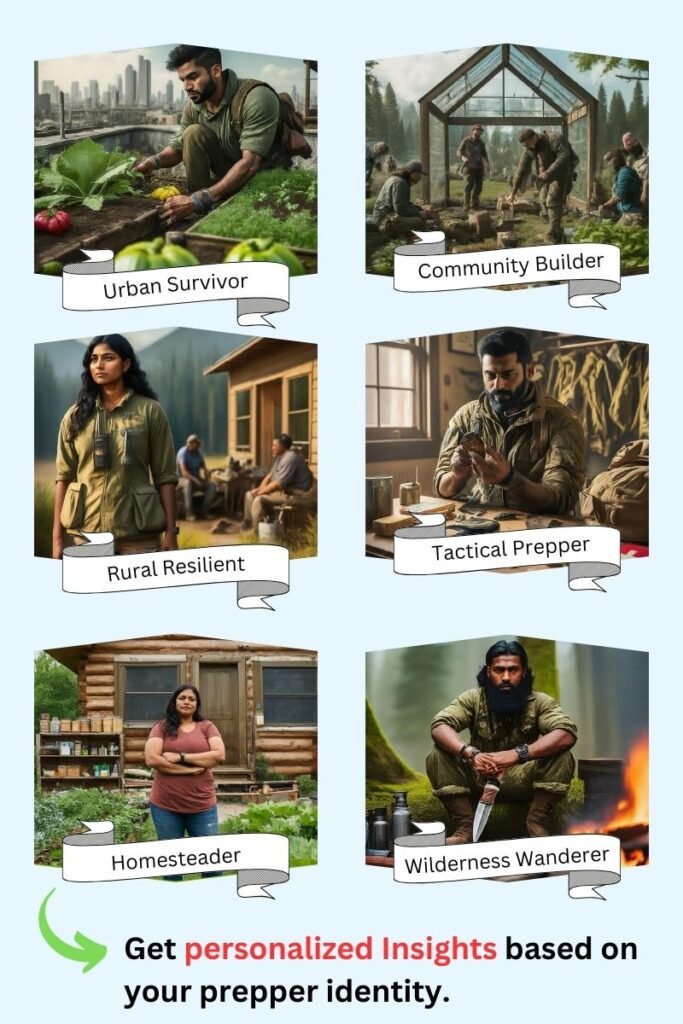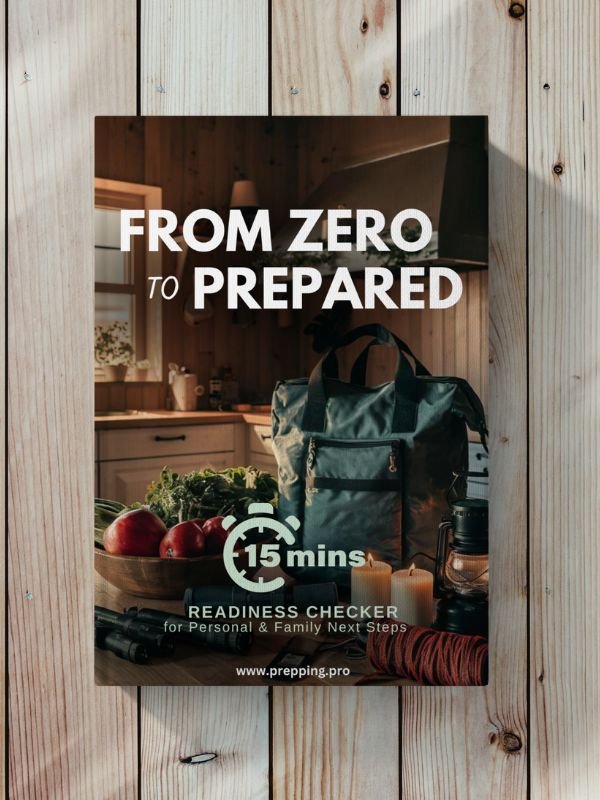In today’s ever-changing world, the ability to adapt and survive in unexpected situations has become increasingly crucial, especially in urban environments. Whether it’s a natural disaster, civil unrest, or a personal crisis, having a repertoire of survival skills life hacks can mean the difference between thriving and merely surviving.
This article will explore 19 advanced survival tips and tricks, covering everything from water procurement to mental resilience, equipping you with the knowledge and ingenuity to navigate even the most challenging circumstances.
Table of Contents
Water Procurement and Purification Hacks
Access to clean water is a fundamental necessity for survival, and in an urban setting, conventional sources may be compromised. Here are some emergency preparedness hacks to help you secure and purify water:
- Finding Water in Unlikely Places:
- Hot water heaters and toilet tanks can provide gallons of water in an emergency.
- Collect condensation from air conditioners, dehumidifiers, and even the air itself using a plastic sheet or tarp.
- Drain water from pipes by opening the lowest faucet in your home.
- DIY Water Filters and Purification Methods:
- Construct a simple water filter using layers of sand, charcoal, and cloth.
- Purify water by boiling it for at least one minute, or use household bleach (16 drops per gallon of water).
- Harness the power of sunlight by using a clear plastic bottle and the SODIS (Solar Water Disinfection) method.
| Water Source | Purification Method | Estimated Time | Pros | Cons |
|---|---|---|---|---|
| Hot Water Heater | None required | Immediate | Readily available, clean water | Limited supply |
| Toilet Tank | Boiling or Bleach | 1-2 hours | Readily available | Potential contaminants |
| Air Conditioner Condensation | Boiling or Bleach | 1-2 hours | Renewable source | Time-consuming |
Food Foraging and Preservation Techniques
In a survival situation, securing a reliable food source is paramount. Embrace these survival hacks for beginners to forage for and preserve food in an urban environment:
- Urban Foraging: Edible Plants in the Concrete Jungle:
- Familiarize yourself with common edible plants, such as dandelions, purslane, and chickweed.
- Scout for fruit trees, berry bushes, and community gardens within your vicinity.
- Exercise caution and proper identification to avoid consuming poisonous plants.
- Preserving and Storing Food for Emergencies:
- Learn basic food dehydration techniques using an oven or homemade dehydrator.
- Master the art of pickling and fermenting to extend the shelf life of perishable foods.
- Store food properly in airtight containers, away from light and moisture.
Shelter and Fire-Making Essentials
Providing adequate shelter and warmth is crucial for survival, especially in harsh weather conditions. Explore these wilderness survival techniques for creating improvised shelters and starting fires:
- Improvised Shelters: From Tarps to Trash Bags:
- Construct a basic lean-to shelter using a tarp, rope, and sturdy branches.
- Repurpose trash bags, cardboard boxes, and other materials to create temporary shelter.
- Insulate your shelter with leaves, newspapers, or any available insulating materials.
- Fire-Starting Hacks: Everyday Items as Tinder:
- Use a battery and steel wool to create a long-lasting ember for fire-starting.
- Harness the power of the sun with a magnifying glass or a water bottle filled with water.
- Carry a few essential fire-starting tools, such as a ferro rod or matches, in a waterproof container.
First Aid and Hygiene Solutions
Maintaining personal hygiene and addressing minor injuries can significantly impact your overall well-being in a survival scenario. Explore these urban survival strategies for first aid and cleanliness:
- Home Remedies and Herbal Alternatives:
- Learn to identify and use common medicinal plants for treating minor ailments.
- Create a basic first-aid kit with essential supplies like bandages, antiseptic, and pain relievers.
- Familiarize yourself with natural remedies for common issues like cuts, burns, and digestive problems.
- Maintaining Cleanliness in Challenging Conditions:
- Improvise a basic washing station using a bucket, soap, and collected rainwater.
- Practice good hygiene habits, such as handwashing and dental care, to prevent illnesses.
- Construct a basic latrine or catholes for waste disposal when plumbing is unavailable.
What Kind of Prepper Are You?
Are you on the level you think you are? Find out.
Navigation and Communication Tricks
Navigating unfamiliar terrain and communicating effectively can be critical in a survival situation. Explore these diy survival skills to help you stay oriented and convey important messages:
- Low-Tech Navigation: Reading Signs and Landmarks:
- Learn to read natural and man-made landmarks for directional cues.
- Use the sun, stars, and other celestial bodies for basic navigation.
- Create a simple compass using a magnetized needle and a container filled with water.
- Sending Signals and Communicating without Technology:
- Familiarize yourself with international distress signals and their meanings.
- Use smoke signals, ground-to-air signaling techniques, or improvised mirrors to attract attention.
- Develop a basic communication system using whistles, hand signals, or Morse code.
Self-Defense and Personal Safety Hacks
Ensuring your personal safety is paramount in any survival situation, especially in urban environments. Equip yourself with these outdoor survival hacks for self-defense and situational awareness:
- Improvised Weapons and Deterrents:
- Identify everyday items that can be repurposed as self-defense tools, such as pens, keys, or heavy objects.
- Create a basic deterrent spray using household ingredients like vinegar or hot peppers.
- Learn basic self-defense techniques and strikes for close-quarter encounters.
- Situational Awareness and Escape Tactics:
- Develop a keen sense of situational awareness by observing your surroundings and identifying potential threats.
- Practice escape and evasion techniques, such as breaking holds or creating distractions.
- Familiarize yourself with safe havens or rally points in your area for emergencies.
Wilderness and Nature Survival Skills
While urban survival is the focus, having a solid foundation in wilderness survival techniques can be invaluable, as you may need to venture into rural areas or face unexpected outdoor challenges:
- Bushcraft Basics: Shelter, Water, and Fire:
- Master the construction of various wilderness shelters, such as debris huts or natural formations.
- Locate and purify water sources in the wild, including streams, springs, and plant transpiration.
- Employ friction-based fire-starting methods like the bow drill or hand drill.
- Identifying Edible Plants and Animal Tracking:
- Learn to identify and forage for common edible plants, berries, and fungi in your region.
- Develop basic animal tracking skills to locate potential food sources or avoid dangerous wildlife.
- Understand the principles of ethical hunting, trapping, and fishing for survival situations.
Mental Resilience and Emotional Preparedness
Survival isn’t just about physical preparedness; it also requires a strong mental fortitude and emotional resilience. Cultivate these essential survival gear hacks to maintain a positive mindset:
- Strategies for Maintaining a Positive Mindset:
- Practice mindfulness and stress-reduction techniques like meditation or deep breathing exercises.
- Develop a daily routine and set achievable goals to maintain a sense of purpose and structure.
- Engage in positive self-talk and visualization exercises to boost confidence and motivation.
- Dealing with Stress, Anxiety, and Fear in Survival Situations:
- Learn to recognize and manage the physical and emotional signs of stress and anxiety.
- Employ grounding techniques, such as focusing on your senses or engaging in physical activity.
- Establish a support system or a buddy system to provide emotional support and accountability.
Improvised Tools and Gear Hacks
In a survival scenario, having the right tools and gear can make a significant difference. Explore these survival gear hacks to create and repurpose essential items:
In a survival scenario, having the right tools and gear can make a significant difference. Explore these survival gear hacks to create and repurpose essential items:
- DIY Survival Tools and Utensils:
- Craft basic tools like knives, spears, or fishing hooks from materials like wood, bone, or metal scraps.
- Repurpose common household items like scissors, can openers, and multi-tools for various survival tasks.
- Make cooking and eating utensils from natural materials like bark, bamboo, or hollowed-out sticks.
- Improvised Backpacks and Carry Systems:
- Use a pillowcase, garbage bag, or even a shirt to create a makeshift backpack or carry-all.
- Weave sturdy materials like vines, rope, or strips of cloth to construct a basic net or basket for carrying supplies.
- Utilize belts, straps, or fabric to fashion a simple shoulder strap or harness for hands-free carrying.
Embracing Resourcefulness and Adaptability
In the ever-changing landscape of survival scenarios, the ability to think outside the box and embrace unconventional solutions is crucial. Cultivate these best survival practices to thrive in any situation:
- Repurposing and Upcycling:
- Adopt a mindset of resourcefulness and learn to see the potential in everyday objects.
- Experiment with different materials and techniques to create unique survival solutions.
- Embrace the concept of “use what you have” and continuously seek out innovative ways to repurpose items.
Conclusion: Adapt, Improvise, and Thrive
In the ever-changing landscape of survival scenarios, the ability to adapt, improvise, and think creatively is paramount. By mastering these 19 advanced survival skills life hacks and embracing the best survival practices, you’ll be equipped to navigate even the most challenging situations with confidence and resilience.
Remember, survival is not just about physical preparedness; it’s also a mindset of resourcefulness, resilience, and continuous learning. Embrace these survival tips and tricks, and you’ll be well on your way to becoming a master of urban and wilderness survival.



